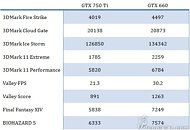- Joined
- Oct 9, 2007
- Messages
- 47,427 (7.51/day)
- Location
- Hyderabad, India
| System Name | RBMK-1000 |
|---|---|
| Processor | AMD Ryzen 7 5700G |
| Motherboard | ASUS ROG Strix B450-E Gaming |
| Cooling | DeepCool Gammax L240 V2 |
| Memory | 2x 8GB G.Skill Sniper X |
| Video Card(s) | Palit GeForce RTX 2080 SUPER GameRock |
| Storage | Western Digital Black NVMe 512GB |
| Display(s) | BenQ 1440p 60 Hz 27-inch |
| Case | Corsair Carbide 100R |
| Audio Device(s) | ASUS SupremeFX S1220A |
| Power Supply | Cooler Master MWE Gold 650W |
| Mouse | ASUS ROG Strix Impact |
| Keyboard | Gamdias Hermes E2 |
| Software | Windows 11 Pro |
Ahead of its rumored mid-February launch, members of Taiwanese tech forum Coolaler.com posted the first performance benchmark numbers of the card. Originally thought to be positioned between the previous-generation GeForce GTX 660 and current GTX 760, the GTX 750 Ti, according to these numbers is on average 10 to 15 percent slower than the GTX 660, which should put its performance somewhere in between the GTX 650 Ti Boost and the GTX 660.
Then again, the testers must be using some very early drivers, and performance figures of the GTX 750 Ti should get clearer as its mid-February launch date approaches. The GeForce GTX 750 Ti is an important GPU for NVIDIA, as it's the first to be based on its next-generation "Maxwell" GPU micro-architecture. NVIDIA is trying the architecture out on current 28 nm process, before launching bigger chips based on the next-generation 20 nm fab process.

View at TechPowerUp Main Site
Then again, the testers must be using some very early drivers, and performance figures of the GTX 750 Ti should get clearer as its mid-February launch date approaches. The GeForce GTX 750 Ti is an important GPU for NVIDIA, as it's the first to be based on its next-generation "Maxwell" GPU micro-architecture. NVIDIA is trying the architecture out on current 28 nm process, before launching bigger chips based on the next-generation 20 nm fab process.

View at TechPowerUp Main Site







